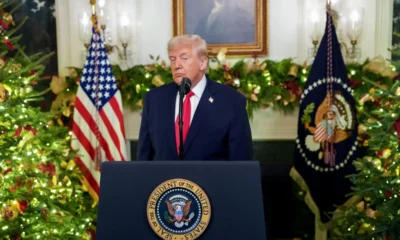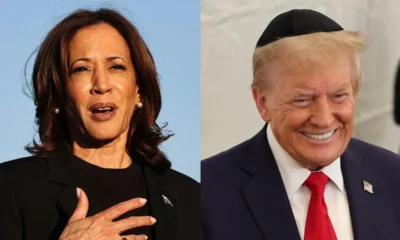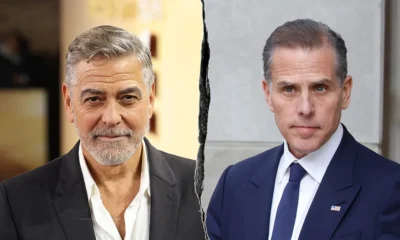Politics
5 Explosive Revelations from Hunter Biden That Turned Washington Upside Down
Hunter Biden defends painting sales and claims Joe Biden took Ambien before the 2024 debate, blasting Trump allies and Obama-era Democrats in a fiery podcast

The political firestorm surrounding Hunter Biden has reached a new high as the president’s son made a series of stunning revelations during a recent podcast interview. Among the most explosive was his claim that President Joe Biden was on Ambien, a powerful sleep aid, just before his widely criticized performance in the 2024 presidential debate—a debate that many saw as a turning point for the Biden reelection campaign.
In the same interview, Hunter Biden also passionately defended his controversial painting sales, calling them his “salvation” from past vices. He didn’t hold back, launching harsh critiques at Donald Trump Jr., the Obama-era Democratic establishment, and prominent media narratives that, in his view, have distorted his father’s legacy and his own reputation.
This deep dive into Hunter Biden’s latest comments paints a picture of a man fiercely loyal to his family, unfiltered in his opinions, and determined to challenge the narratives that have long haunted him.
Ambien and the Debate Disaster
One of the most headline-grabbing moments in the podcast came when Hunter Biden explained what really happened behind the scenes of the 2024 presidential debate. According to him, the president had been prescribed Ambien to help him sleep during a grueling international travel schedule.
“He flew around the world, basically, the mileage that he could have flown around the world, three times. He’s 81 years old. He’s tired as s—. They give him Ambien to be able to sleep,” Hunter said, painting a picture of exhaustion and overwork.
He added that the president looked “like a deer in the headlights” during the debate — an image that resonated with viewers and opponents alike.
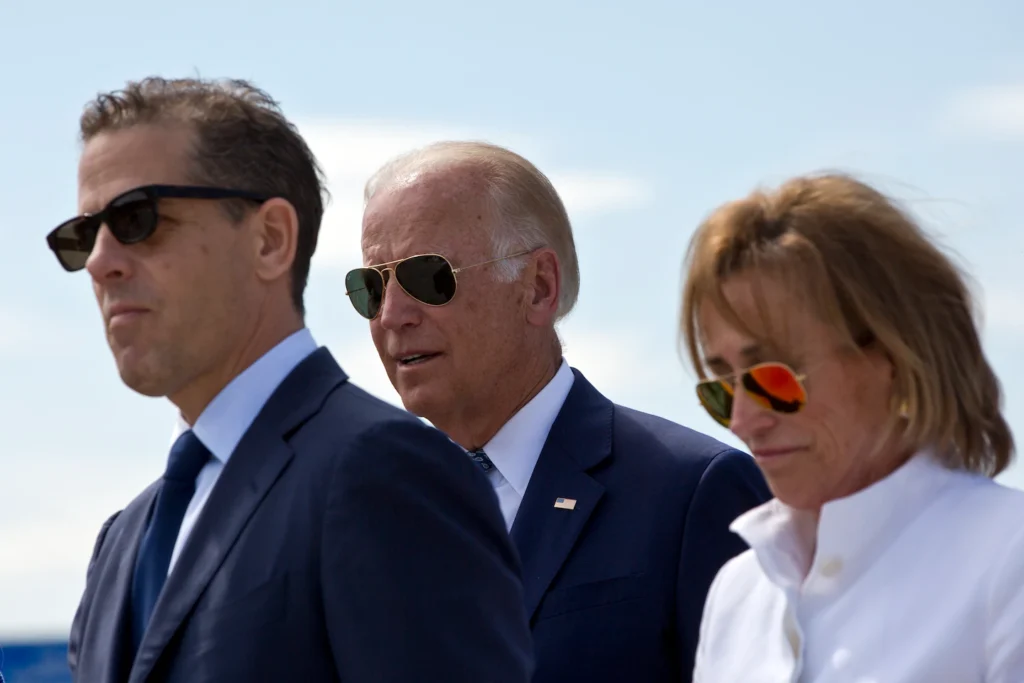
This revelation, if true, introduces a serious new angle to the conversation around Joe Biden’s fitness for office, especially as he continues to seek reelection. Hunter Biden’s intent, however, was not to discredit his father but to contextualize a widely panned debate performance that led to Democratic panic and public outcry.
“Did Joe Biden Get Old? Yeah, He Got Old.”
Throughout the podcast, Hunter Biden acknowledged the inevitable decline of age but fiercely defended the achievements and determination of his father.
“Did Joe Biden get old? Yeah, he got old. He got old before our eyes,” he admitted.
“But the people who came out against him—who were they? Nobody. Except [Nancy] Pelosi didn’t give a full-throated endorsement and that gave everyone else permission to back off.”
He praised progressive leaders like Alexandria Ocasio-Cortez (AOC), Bernie Sanders, and Ro Khanna, saying they rallied behind Joe Biden for delivering on climate change, economic equity, and healthcare initiatives. Hunter credited these progressive endorsements with pushing his father past the doubts raised by older members of the party establishment.
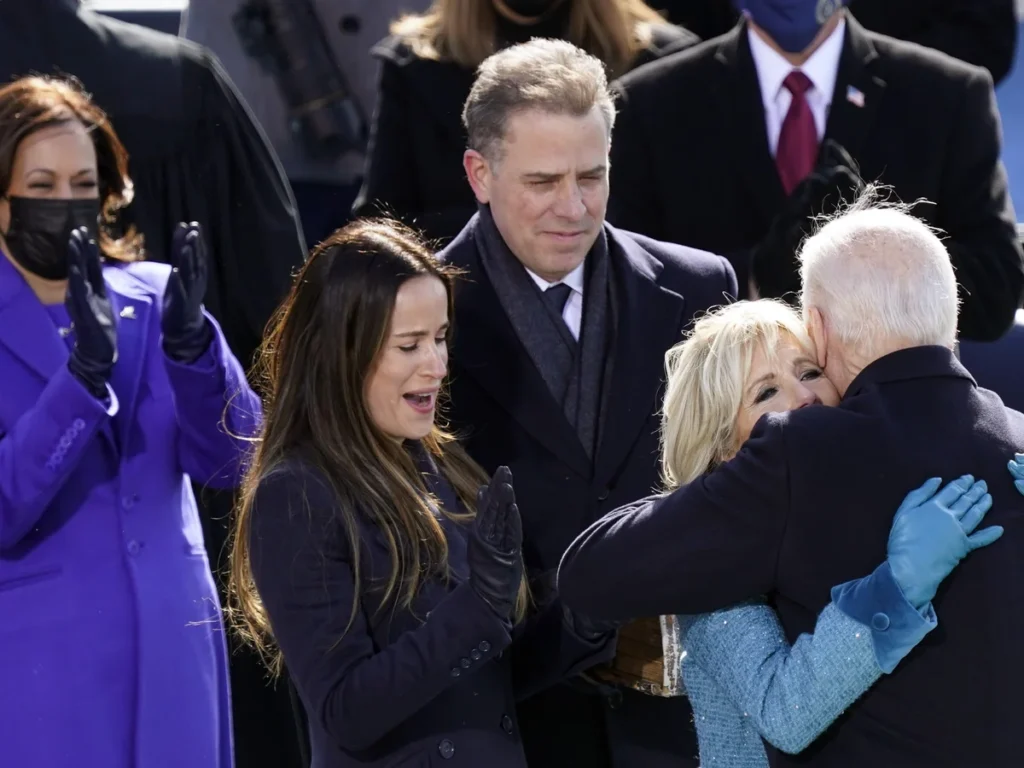
Lashing Out at Obama’s Inner Circle
No one was spared in Hunter’s verbal takedown, including Obama-era officials and the podcasting crew behind Pod Save America — Jon Favreau, Tommy Vietor, and Jon Lovett — all former aides to President Barack Obama.
“[They’re] White millionaires that are dining out on their association with Barack Obama from 16 years ago… living in Beverly f—ing Hills telling the rest of the world what Black voters in South Carolina really want.”
He went on to mock Rahm Emanuel, the current U.S. ambassador to Japan, and David Axelrod, Obama’s former chief strategist, hinting sarcastically that they’d run for president and manage each other’s campaigns.
These comments reflect deep tension between the Bidens and those from the previous Democratic administration — a fracture that seems to grow more visible with every passing political cycle.
The Real Story Behind the Painting Sales
Hunter Biden’s paintings have long been a subject of media scrutiny, with accusations that the artwork was merely a vehicle for influence peddling. But for the first time, Hunter shared the emotional and psychological context behind his art.
“They accused me of crimes for painting. Not that I couldn’t sell my paintings, but that it was a conspiracy to launder money and curry influence,” he said.
He defended his passion, saying painting helped him recover from substance abuse and mental health struggles. “It saved me,” he stated simply.
“It’s acrylic on canvas. But suddenly it’s like I’m controlling nuclear deals through abstract art.”
Hunter’s frustration is rooted in what he views as a hypocritical double standard. While critics speculate about the sale of his artwork, figures like Donald Trump Jr. are openly profiting off political connections, he argued.
Turning the Tables on Don Jr.
Hunter was especially scathing toward Donald Trump Jr., claiming that if anyone is openly peddling influence, it’s Trump’s son.
“Don Jr. is opening a club called the Executive Club in Georgetown… $500,000 initiation fee to rub shoulders with cabinet officials. And nobody’s batting an eye.”
The hypocrisy, according to Hunter Biden, is glaring: his personal hobbies are demonized while members of the Trump family continue to leverage political proximity for commercial gain without scrutiny.

Rewriting the 2020 Nomination Story
The idea that Joe Biden was the Democratic Party’s inevitable choice in 2020? Not so fast, said Hunter.
“Bull—-. We lost Iowa. We lost New Hampshire. We came in second in Nevada.”
He recounted how the campaign was counted out by major figures like David Plouffe and David Axelrod, only to rebound with overwhelming support from rural and urban voters who said, “F— you. We love Joe.”
Final Thoughts: Hunter Biden Unfiltered
This podcast appearance marks a rare moment of Hunter Biden going full throttle — not in defense of himself, but in fierce loyalty to his father and his version of political truth.
Whether you believe his justifications or question his motives, one thing is clear: Hunter Biden is done playing defense. He’s calling out everyone — Trump allies, Obama-era loyalists, media elites — and in doing so, he’s reframing the conversation around influence, legacy, and personal redemption.
Politics
The Untold Strain of Sundance Festival Insiders Describe the Emotional Highs and Breaking Points
A racially charged confrontation at a high-profile Sundance gathering turns violent, prompting an arrest and reigniting debate over hate speech and political rhetoric in public spaces.
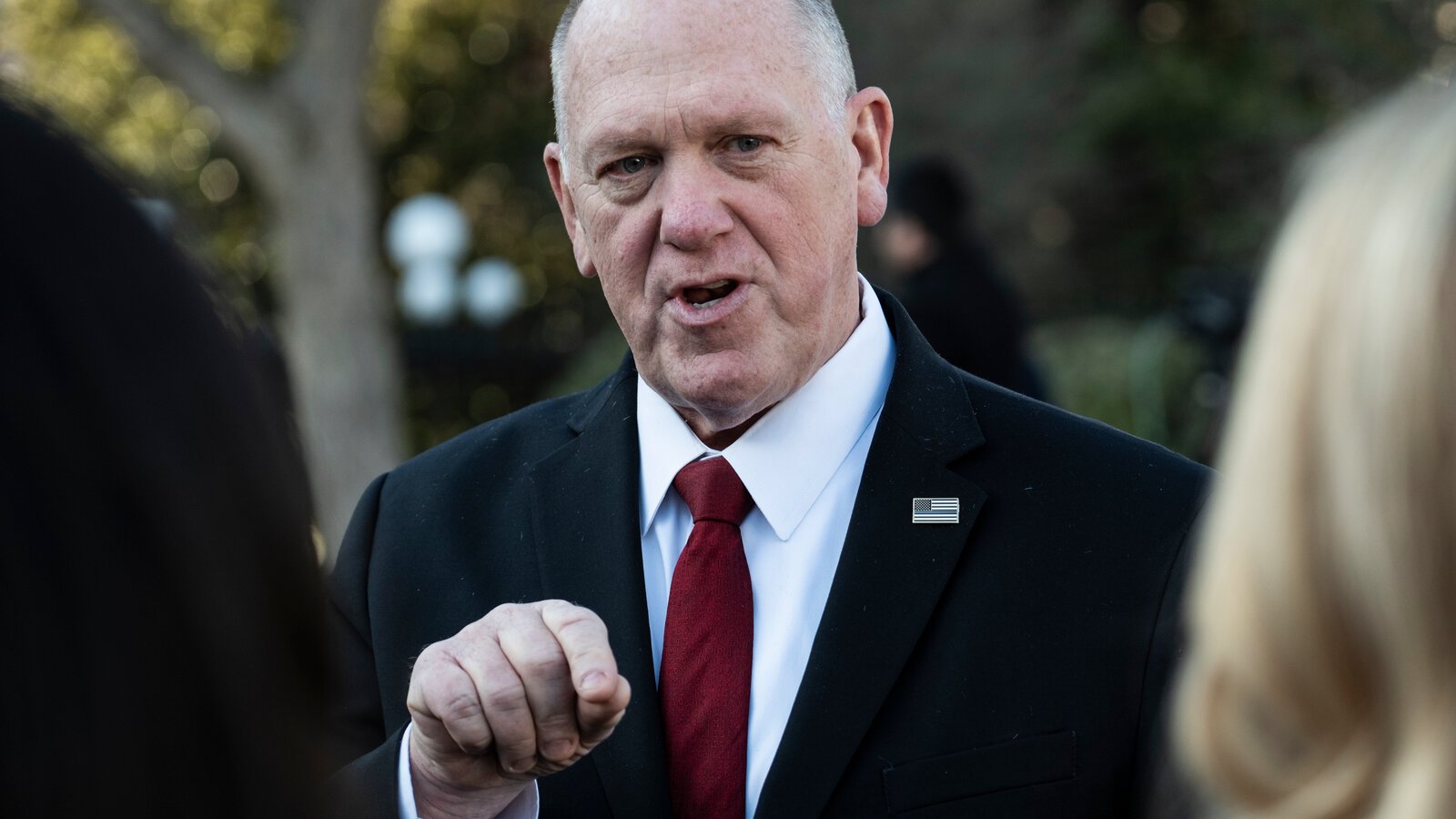
What was meant to be an exclusive celebration during the Sundance Film Festival ended in shock and outrage after a racially charged confrontation turned violent, leading to an arrest and widespread condemnation.
A man was taken into custody following an incident at a private party hosted by Creative Artists Agency (CAA) during Sundance, where he allegedly confronted U.S. Congressman Maxwell Alejandro Frost with racist remarks before physically assaulting him.
According to Frost’s account, the man loudly proclaimed how “proud” he was to be white, then escalated the encounter by telling the congressman that Donald Trump was “going to deport me” — a statement Frost confirmed was made moments before he was punched in the face.
The confrontation unfolded amid one of the most influential gatherings tied to the Sundance Film Festival, a space typically associated with artistic expression, political dialogue, and cultural inclusivity.
From Political Taunt to Physical Violence
Frost, the first Gen Z member of Congress and a prominent progressive voice, later confirmed the details of the incident, describing it as an unprovoked escalation rooted in racial identity and political hostility.
ALSO READ : “She Never Made It Out…” Albany House Fire Claims Woman’s Life as Family Pleads for Help to Bring Her Home
Witnesses at the event reported that the man appeared intoxicated and increasingly aggressive before security intervened. Law enforcement confirmed that the suspect was arrested on the scene and that charges are being reviewed.
While authorities have not publicly released the suspect’s name, officials noted that the investigation is treating the matter seriously given the racially charged language used during the encounter.
A Disturbing Pattern Beyond One Night
The incident has quickly drawn national attention, not only because it involved a sitting member of Congress, but because it echoes broader concerns about rising political aggression and racially motivated confrontations in public spaces.
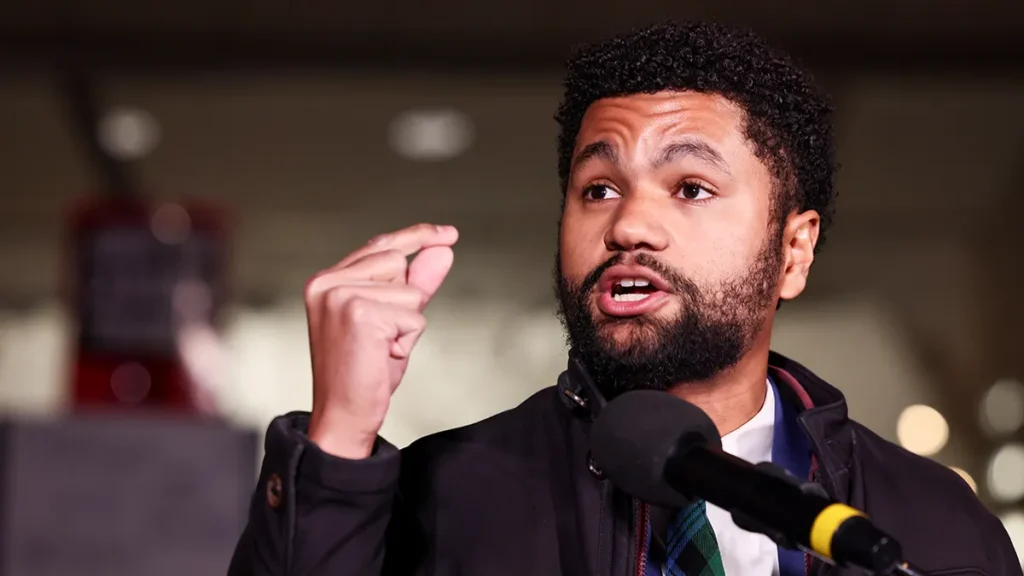
Civil rights advocates argue that rhetoric surrounding immigration, race, and nationalism has increasingly crossed from speech into action — especially in environments where alcohol, political identity, and social status intersect.
“This wasn’t just an argument,” one attendee said. “It felt like something much darker bubbling to the surface.”
CAA and Sundance Respond
CAA representatives emphasized that the party was meant to be a safe, private gathering and that they are cooperating fully with authorities. Festival organizers also distanced the event from official Sundance programming while condemning the violence.
The Sundance Film Festival, long positioned as a platform for marginalized voices and progressive storytelling, has faced renewed scrutiny over security protocols at affiliated private events.
Frost Breaks the Silence
Frost later addressed the incident publicly, underscoring that he would not be intimidated by threats or violence.
“No one should have to endure this — anywhere,” he said, adding that the incident reinforced the importance of confronting hate head-on rather than normalizing it.
Support poured in from fellow lawmakers, artists, and activists, many of whom called for stronger accountability when racially charged speech turns into physical harm.
More Than a Single Arrest
As the investigation continues, the episode has sparked a wider conversation about the responsibility of political leaders, cultural institutions, and event organizers in ensuring safety — especially at moments when rhetoric becomes combustible.
For many, the most unsettling part of the story is how quickly ideology transformed into violence — and how casually the threat of deportation was invoked as a weapon.
What happened at a Sundance party may fade from headlines, but the issues it exposed are far from temporary.
Politics
“Trump Deportation Threat Turned Into Assault”: Man Arrested After Shocking Sundance Incident
A racially charged confrontation at a high-profile Sundance gathering turns violent, prompting an arrest and reigniting debate over hate speech and political rhetoric in public spaces.

What was meant to be an exclusive celebration during the Sundance Film Festival ended in shock and outrage after a racially charged confrontation turned violent, leading to an arrest and widespread condemnation.
A man was taken into custody following an incident at a private party hosted by Creative Artists Agency (CAA) during Sundance, where he allegedly confronted U.S. Congressman Maxwell Alejandro Frost with racist remarks before physically assaulting him.
According to Frost’s account, the man loudly proclaimed how “proud” he was to be white, then escalated the encounter by telling the congressman that Donald Trump was “going to deport me” — a statement Frost confirmed was made moments before he was punched in the face.
The confrontation unfolded amid one of the most influential gatherings tied to the Sundance Film Festival, a space typically associated with artistic expression, political dialogue, and cultural inclusivity.
From Political Taunt to Physical Violence
Frost, the first Gen Z member of Congress and a prominent progressive voice, later confirmed the details of the incident, describing it as an unprovoked escalation rooted in racial identity and political hostility.
ALSO READ : “She Never Made It Out…” Albany House Fire Claims Woman’s Life as Family Pleads for Help to Bring Her Home
Witnesses at the event reported that the man appeared intoxicated and increasingly aggressive before security intervened. Law enforcement confirmed that the suspect was arrested on the scene and that charges are being reviewed.
While authorities have not publicly released the suspect’s name, officials noted that the investigation is treating the matter seriously given the racially charged language used during the encounter.
A Disturbing Pattern Beyond One Night
The incident has quickly drawn national attention, not only because it involved a sitting member of Congress, but because it echoes broader concerns about rising political aggression and racially motivated confrontations in public spaces.

Civil rights advocates argue that rhetoric surrounding immigration, race, and nationalism has increasingly crossed from speech into action — especially in environments where alcohol, political identity, and social status intersect.
“This wasn’t just an argument,” one attendee said. “It felt like something much darker bubbling to the surface.”
CAA and Sundance Respond
CAA representatives emphasized that the party was meant to be a safe, private gathering and that they are cooperating fully with authorities. Festival organizers also distanced the event from official Sundance programming while condemning the violence.
The Sundance Film Festival, long positioned as a platform for marginalized voices and progressive storytelling, has faced renewed scrutiny over security protocols at affiliated private events.
Frost Breaks the Silence
Frost later addressed the incident publicly, underscoring that he would not be intimidated by threats or violence.
“No one should have to endure this — anywhere,” he said, adding that the incident reinforced the importance of confronting hate head-on rather than normalizing it.
Support poured in from fellow lawmakers, artists, and activists, many of whom called for stronger accountability when racially charged speech turns into physical harm.
More Than a Single Arrest
As the investigation continues, the episode has sparked a wider conversation about the responsibility of political leaders, cultural institutions, and event organizers in ensuring safety — especially at moments when rhetoric becomes combustible.
For many, the most unsettling part of the story is how quickly ideology transformed into violence — and how casually the threat of deportation was invoked as a weapon.
What happened at a Sundance party may fade from headlines, but the issues it exposed are far from temporary.
Politics
Why Bari Weiss Says Pulling a ‘60 Minutes’ Story Was the Right Call — Even If It Looked Radical
Facing backlash from activists and political pressure alike, the CBS News editor-in-chief argues that controversial editorial calls are essential to restoring public trust in the media.
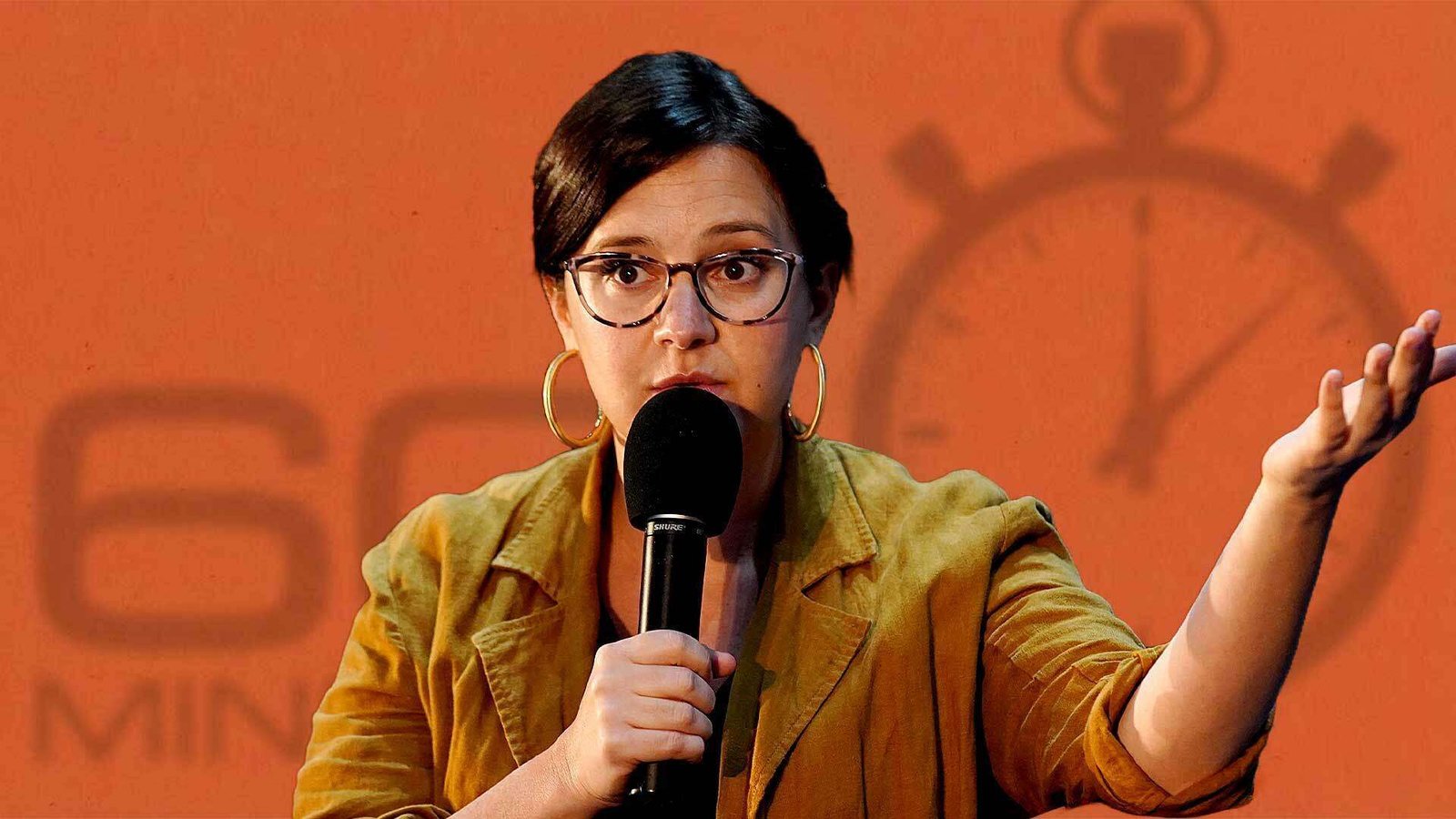
In an era when every editorial decision is dissected in real time, Bari Weiss is standing firm behind one of the most controversial calls of her tenure at 60 Minutes.
Weiss has once again defended her last-minute decision to pull a segment from the long-running CBS newsmagazine, acknowledging that the move “may seem radical” to outsiders—but insisting it was necessary to protect what she calls the integrity of the news.
In a memo sent to staff and co-signed by Tom Cibrowski, along with senior editors Charles Forelle and Adam Rubenstein, Weiss framed the decision as part of a broader effort to rebuild public confidence in journalism at a time when trust in media institutions continues to erode.
The Story at the Center of the Storm
The pulled segment reportedly focused on the experiences of Venezuelan migrants deported by the Donald Trump administration to a prison in El Salvador—a topic that sits at the intersection of immigration policy, human rights, and partisan politics.
ALSO READ : “She Never Made It Out…” Albany House Fire Claims Woman’s Life as Family Pleads for Help to Bring Her Home
According to Weiss, the issue was not the subject matter itself, but whether the segment met the editorial standards the newsroom demands before airing.
“No amount of outrage—whether from activist organizations or the White House—will derail us,” Weiss wrote in the memo, making clear that external pressure did not drive the decision.
Instead, she characterized the move as an example of editorial restraint at a time when speed, outrage, and social-media reaction often dominate newsroom judgment.
A ‘Radical’ Choice in a Polarized Media Climate
Weiss did not shy away from describing the decision as controversial. In fact, she embraced that reality, arguing that journalism sometimes requires choices that invite criticism from all sides.
In today’s media environment, pulling a completed story—especially one tied to immigration and a former president—is almost guaranteed to ignite backlash. For Weiss, that backlash is part of the cost of maintaining standards.
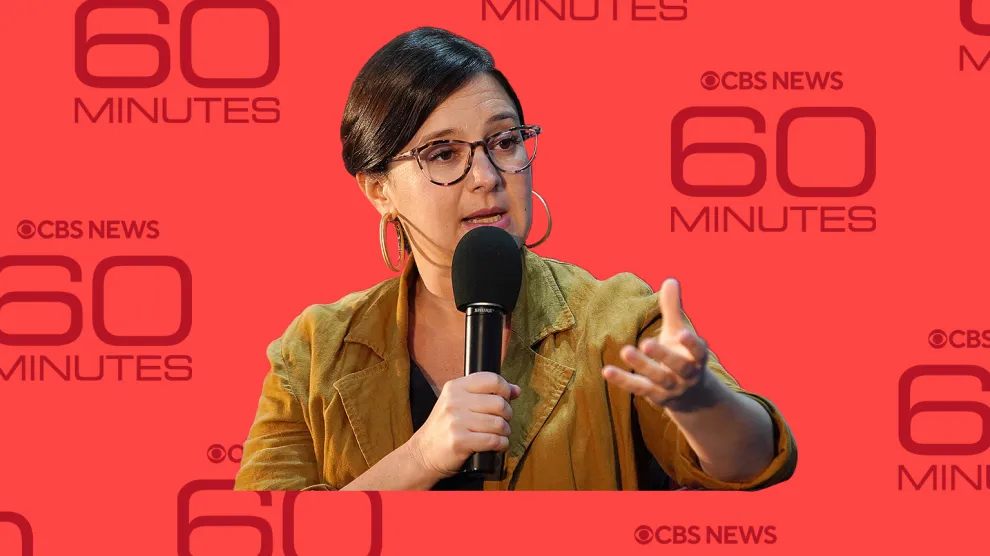
“Necessary decisions can cause a firestorm,” she acknowledged, suggesting that editorial courage is often indistinguishable from provocation in a deeply polarized public sphere.
Trust as the Real Battleground
At the heart of Weiss’s defense is a larger concern: Americans’ declining trust in news organizations.
By emphasizing caution over immediacy, Weiss positioned the decision as a long-term investment in credibility rather than a short-term reputational hit. Her message to staff was clear—journalistic integrity must outweigh the pressure to satisfy activists, political actors, or even audience expectations.
The memo’s tone reflected a newsroom aware that neutrality itself has become suspect, and that editorial leadership now involves navigating not just facts, but perceptions of motive.
What This Means for ‘60 Minutes’ and CBS News
For CBS News, the controversy underscores how even legacy institutions are struggling to operate in a climate where every editorial choice is interpreted through ideological lenses.
60 Minutes, long regarded as one of the most influential investigative programs in American television, now finds itself at the center of a debate about transparency, restraint, and the line between caution and censorship.
Supporters of Weiss argue that pulling the story demonstrates editorial responsibility. Critics contend it risks chilling coverage of sensitive topics.
Both sides, however, agree on one thing: decisions like this are shaping the future of mainstream journalism.
A Defining Moment for News Leadership
Whether Weiss’s call ultimately strengthens or weakens public trust remains an open question. But her willingness to publicly frame the decision as “radical” suggests an editor aware that traditional newsroom playbooks no longer apply.
In a media landscape driven by immediacy and outrage, restraint itself may now be the most provocative stance of all.
-

 Entertainment1 week ago
Entertainment1 week agoHe-Man Wears a Suit Now… Nicholas Galitzine’s ‘Masters of the Universe’ Trailer Drops a Shock Fans Didn’t See Coming
-

 Entertainment1 week ago
Entertainment1 week agoBrazil Eyes Oscar History Again… ‘The Secret Agent’ Scores Best Picture Nomination as Wagner Moura Stuns Hollywood
-

 Entertainment5 days ago
Entertainment5 days ago“Comedy Needs Courage Again…”: Judd Apatow Opens Up on Mel Brooks, Talking to Rob Reiner, and Why Studio Laughs Have Vanished
-

 Entertainment1 week ago
Entertainment1 week agoOscars Go Global in a Big Way as This Year’s Nominations Signal a New Era: ‘The Academy Is Finally Looking Beyond Hollywood…’
-
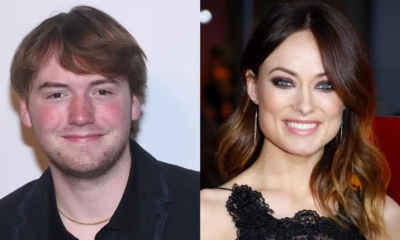
 Entertainment1 week ago
Entertainment1 week ago“Dangerously Kinky… and Darkly Funny”: Olivia Wilde and Cooper Hoffman Push Boundaries in ‘I Want Your Sex’
-

 Sports1 week ago
Sports1 week agoA Strong Night for Caleb Williams Ends With Doubts About the Bears’ Late Decisions
-
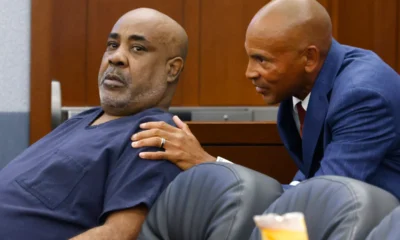
 Crime5 days ago
Crime5 days agoMan Accused in Tupac Shakur Killing Asks Judge to Exclude Critical Evidence
-

 Politics1 week ago
Politics1 week agoWhy Bari Weiss Says Pulling a ‘60 Minutes’ Story Was the Right Call — Even If It Looked Radical


